A crowd surged forward to Fethullah Gulen’s grave on Thursday, straining to get one more chance to pay their respects to the influential Turkish spiritual leader and Islamic scholar who died this week in self-exile in the United States.
After an outdoor service in New Jersey that drew thousands of people, Gulen was buried on the grounds of the Chestnut Retreat Center, a sprawling, gated compound in Pennsylvania’s Pocono Mountains where he lived and worked for a quarter-century.
Gulen, who inspired a global social movement while facing unproven allegations that he orchestrated a failed 2016 military coup against Turkey’s president, died Sunday at a Pennsylvania hospital. He was in his 80s.
He was remembered Thursday as a religious leader who encouraged his followers to devote themselves to God and to charitable good works.
“We all feel like we’ve lost a father,” Usame Tunagar, a longtime associate, told mourners. “We all feel like as if we are orphaned. There is right now a huge void in our lives.”
But Tunagar said Gulen will live on through his books and sermons, and through the thousands of schools and other institutions worldwide started by his followers.
“What is alive is his legacy,” he said.
Under a heavy police presence, family, friends and followers filled a small stadium in northern New Jersey for a prayer service, which was conducted largely in Turkish, with Islamic prayers and readings in Arabic from the Quran.
Followers who served as pallbearers either studied under Gulen directly or attended a school inspired by his movement. They walked into the stadium carrying his the casket, which was draped in a green-and-gold covering inscribed with verses from the Muslim holy book.
Organizers said a brother and a sister were in attendance. Another brother is imprisoned in Turkey.
No memorial services are expected to take place in Turkey, as publicly mourning, glorifying or otherwise sympathizing with Gulen there may lead to imprisonment on charges of promoting and supporting terrorism.
After the service in New Jersey, hundreds gathered at Gulen’s burial in Saylorsburg, Pennsylvania, on the grounds of the Islamic retreat center. The crowd squeezed into a tight perimeter around the burial site, with mourners pressing in to grab a handful of dirt to throw into the grave.
Mina Turkyolu, a 22-year-old grand-niece of Gulen whose father was a close associate of the religious leader for 50 years, said she remembers Gulen as having a “warm and big heart.” She said she remembers sitting on his lap as a small child and Gulen giving her chocolate. But she said she was always mindful of his position.
“Even though we are family, anyone you would ask, he’s never really been considered as family. He’s always been more of a holy and noble person that you’ve always looked up to. So he’s always been an inspiration for all of us, for millions of people,” she said.
Gulen had long been one of Turkey’s most important scholars, with legions of followers in his native country and around the world. He had lived in the United States since 1999, when he came to seek medical treatment.
His philosophy blended Sufism – a mystical form of Islam – with staunch advocacy of democracy, education, science and interfaith dialogue. His acolytes built a loosely affiliated global network of charitable foundations, professional associations, businesses and schools in more than 100 countries, including 150 taxpayer-funded charter schools throughout the United States.
The religious leader began as an ally of Turkish leader Recep Tayyip Erdogan but became a foe. He called Erdogan an authoritarian bent on accumulating power and crushing dissent. Erdogan cast Gulen as a terrorist, accusing him of masterminding the attempted coup on July 15, 2016, when factions within the military used tanks, warplanes and helicopters to try to overthrow the government.
A total of 251 people were killed and around 2,200 others were wounded. Around 35 alleged coup plotters were killed.
Shortly after the coup attempt, the normally reclusive cleric summoned reporters to his living quarters at the Pennsylvania compound to deny any knowledge or involvement in its planning. He said he wouldn’t have returned to Turkey even if the coup had succeeded, fearing he would be “persecuted and harassed.”
“This is a tranquil and clean place and I enjoy and I live my freedom here,” Gulen said of the secluded Islamic retreat, founded by Turkish Americans, that he adopted as his home and where he would be buried eight years later. “Longing for my homeland burns in my heart, but freedom is also equally important.”
In Turkey, Gulen’s movement – sometimes known as Hizmet, Turkish for “service” – has been subjected to a broad crackdown. The government arrested tens of thousands of people for their alleged link to the coup plot, sacked more than 130,000 suspected supporters from civil service jobs and more than 23,000 from the military, and closed hundreds of businesses, schools and media organizations tied to Gulen.
The Turkish government reacted to his death this week by vowing to keep up the pressure on the Gulenist movement. Erdogan said Gulen had suffered a “dishonorable death” and likened him to a “demon in human form.” He pledged the movement would be “completely eliminated.”
Gulen was never charged with a crime in the US, and the US government had rejected Turkey’s demands to extradite him. The cleric consistently denounced terrorism as well as the coup plotters.
Mustafa Yilmaz, 46, taught chemistry at Gulen-affiliated schools abroad and in Turkey until 2016, when he fled his home country amid Erdogan’s crackdown and was granted asylum in Canada.
Yilmaz, who lives in Toronto, traveled to New Jersey for Gulen’s funeral. He called it an “important task for me to be here.”
“We’re always going to follow what he left us,” Yilmaz said. [AP]






















































